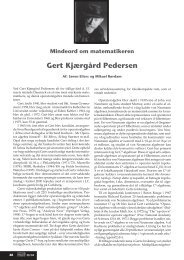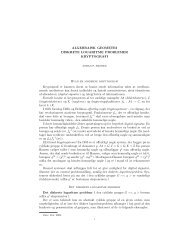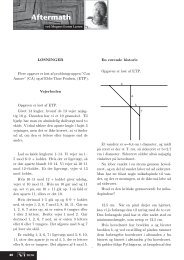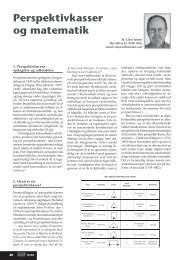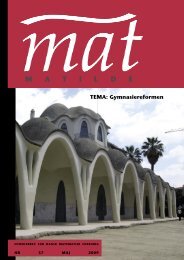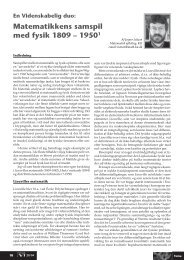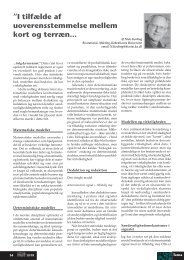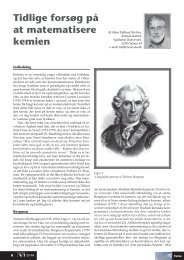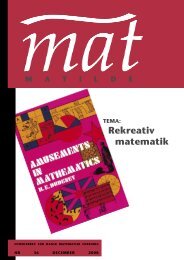MAT 15 - Matilde - Dansk Matematisk Forening
MAT 15 - Matilde - Dansk Matematisk Forening
MAT 15 - Matilde - Dansk Matematisk Forening
Create successful ePaper yourself
Turn your PDF publications into a flip-book with our unique Google optimized e-Paper software.
Centralization and regionalization: In the pre-computer<br />
days it used to be said that a mathematician didn’t<br />
require much by way of equipment; just a few reams of<br />
paper, a blackboard and some penetrating ideas. Today,<br />
although much research is still done in that mode, we find<br />
increasingly that mathematicians require the aid of supercomputer<br />
installations. This is still far less costly than,<br />
say, the billions of dollars of laboratory equipment required<br />
by high-energy physicists or astrophysicists.<br />
Centralization of mathematics occurs as the result of a<br />
number of factors: (1) The willingness and ability of a<br />
society to support mathematical activity (2) The desire<br />
and the utility of having mathematicians work in groups,<br />
centers, etc. The notion of the critical inter-communicating<br />
mass of creative individuals is at work here. New<br />
systems of rapid intercommunication and transport of<br />
graphical and printed material may in the future affect<br />
the clumping of centers for research and development.<br />
Politicization: While the contents of mathematics is<br />
abstract, mathematics is created by people and is often<br />
applied by people to people. It is to be expected, then,<br />
that the creation and the application of mathematics<br />
should be subject to support, pressures, monitoring and<br />
suppression by governmental, political or even religious<br />
institutions. The interaction between mathematics and<br />
human institutions has a long and documented history.<br />
Q11. Give me ten points that worry a concerned<br />
mathematician.<br />
A11. A concerned mathematician will worry about the<br />
abuse, misuse, or misinterpretation of mathematics or of<br />
its applications. But remember that even people who have<br />
been satirized as technocrats, computocrats or mathocrats<br />
may all be concerned people.<br />
Rettelser til <strong>Matilde</strong> 19<br />
Korrekturen på <strong>Matilde</strong> 19 foregik under stort tidspres, så en del trykfejl blev overset. Redaktørerne beklager.<br />
Det var flest problemer i Claus Jensens artikel om Perspektivkasser.<br />
En ny version af denne artikel med nogle rettelser kan ses i <strong>Matilde</strong>s arkiv<br />
http://www.matilde.mathematics.dk/arkiv/M19/claus_jensen.pdf<br />
Eksperimentel matematikundervisning<br />
forts. fra side 13<br />
til produkter, der kunne omsættes i<br />
ny indsigt.<br />
Litteratur<br />
[1] J. Borwein, D. Bailey. Mathematics<br />
by Experiment: Plausible Rea-<br />
20 20/04<br />
Insofar as we are living in a thoroughly mathematized<br />
civilization, the number of concerns is necessarily vast<br />
and it is natural that most concern is focussed on “life<br />
and death” issues. If, for example, a mathematical criterion<br />
were developed via encephalography for determining<br />
whether a person is “brain dead”, then this would engender<br />
a great deal of concern.<br />
Niels Richard Hansen, forfatteren til “Bioinformatik - en statistisk disciplin” er tilknyttet<br />
Afdeling for Anvendt Matematik og Statistik, KU<br />
email: richard@math.ku.dk<br />
soning in the 21st Century,AKPeters,<br />
2003.<br />
[2] N.P. Fogg, Substitutions in dynamics,<br />
arithmetics and combinatorics,<br />
Lecture Notes in Mathematics,<br />
vol. 1794, Springer-Verlag,<br />
Heidelberg, 2002.<br />
Q12. I read a statement attributed to the famous<br />
physicist Max Born that the destructive potential of<br />
mathematics is an immanent trend. If that is so, why<br />
then should I, an average person, know a whole lot<br />
more about mathematics?<br />
A12. You should know more about it for precisely that<br />
reason.<br />
All creative acts have destructive potential. Though<br />
we try to reduce the risk, an electrical outlet in the average<br />
home is not totally risk-free. The destructive or revolutionary<br />
potential of graphical arts, of literature is well<br />
documented. Even as mathematics solves many problems,<br />
it creates new problems, both internal to it and external.<br />
To live is to be at risk, and no number of insurance<br />
policies can reduce the psychological risk to zero. Moreover,<br />
to live at the very edge of risk is thought by some<br />
people to be “truly alive.”<br />
The more the average person knows, the better off<br />
that person is to make judgements. Some of those judgements<br />
will be how to balance risk with prudence. In a<br />
world in which scientific, technological and social changes<br />
occur rapidly, a democratic society cannot long endure<br />
in the presence of ignorance.<br />
[3] D. Lind and B. Marcus, An introduction<br />
to symbolic dynamics<br />
and coding, Cambridge University<br />
Press, Cambridge, 1995. MR<br />
97a:58050



